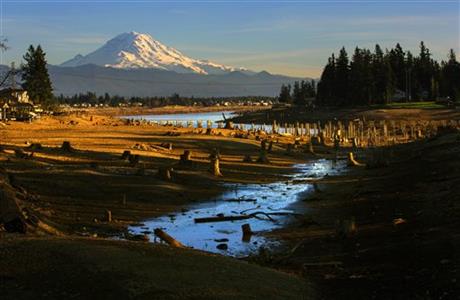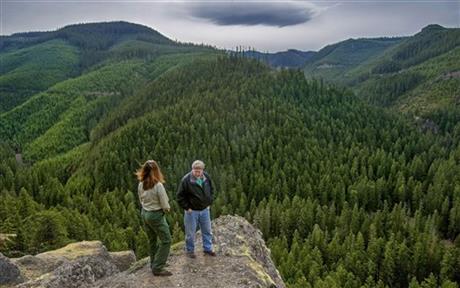By PHUONG LE
SEATTLE (AP) – With Washington state experiencing the worst mountain snowpack in decades and a drought emergency declared two weeks ago, farmers, growers and wildlife managers are preparing for a tough summer as conditions are expected to worsen.
Some farmers and irrigators are forgoing watering crops and pastures for all or part of the season in exchange for lease payments from the state. Others are seeking permission to tap emergency wells or drill new ones. A large irrigation district in the Yakima River basin shut off the water for a few weeks this month to save supply for later.

Fish managers are keeping close watch on rivers where salmon heading upstream may get stranded or could be harmed by shallow, warmer stream temperatures.
The statewide snowpack level is less than 10 percent of normal, and about one-fifth of the state’s rivers and streams are at record low levels, prompting Gov. Jay Inslee to declare a statewide drought emergency on May 15. He said agriculture, wildlife and communities with small water systems will be hit hardest.
The declaration allows the Department of Ecology to buy and lease water for farmers, protect salmon and help those facing hardships, but the agency is still waiting for the money. The state Senate approved $18 million over two years in emergency drought relief as the first special session closed Thursday, but the House hasn’t taken action yet.
“This is the worst snowpack we’ve seen since we started collecting data in the 1930s,” said Scott Pattee, a water supply specialist with the Natural Resources Conservation Service. “The state is in a drought, even though we’ve had a normal water year.”
Unlike drought-stricken California, where mandatory water restrictions are in place, rainfall has been normal in Washington this winter. So water suppliers in cities such as Seattle, Spokane, Tacoma and Vancouver, have a good supply in rain-fed reservoirs or aquifers and don’t anticipate water limits. Yakima also likely won’t curtail water though the city recently launched a campaign encouraging residents to conserve.
But low snowpack means there won’t be much to replenish streams and rivers this summer when migrating fish and farmers who rely on irrigation need it most.
Not everyone will feel the pinch. Those who hold the oldest claims to water, known as senior water rights, are less vulnerable to water shortages and may not have to curtail use. They’ll get water before those holding lesser rights.

Brent DeKoning grows Timothy hay on about 700 acres in Ellensburg and gets water from the Kittitas Reclamation District, a junior-right holder whose water allotment will be 44 percent of normal.
DeKoning said he’ll only get one cutting of hay earlier in the season, rather than two. And he won’t be able to plant new hay in the fall or plant a rotation crop like corn or wheat, he said.
“You just have to weather it out,” he said. “You just hope that the reservoir and the snowpack come back in the fall.”
Ben Smith, who owns a 600-acre dairy farm in Sequim with his brother, said he sized up the situation, anticipated possible reductions and decided to lease some water to the state to keep flows in the Dungeness River for fish.
“We’re very concerned if we’ll have enough water to irrigate,” said Smith, who grows barley, grass and corn to feed about 1,000 Holstein cows, bulls and calves.
Without enough water to grow its own feed, the farm will have to buy it. Smith said he’ll use money from the water leases to cover the cost.
The water he agrees to forgo in the last 30 days of the season will keep water in the river for migrating salmon.
The state Department of Fish and Wildlife is buying more equipment to recirculate water at its fish hatcheries, stocking up on disease treatments and considering whether it needs to move fish or release them early, said Teresa Scott, the agency’s drought coordinator.
“We’re doing everything we can to make sure the fish in hatcheries are protected,” she said.
This month, a group of irrigators agreed to turn off irrigation for 17 hours to keep more water in a 31-mile stretch of the Walla Walla River for salmon and other fish.
Jim Probert, who raises about 750 cattle on irrigated pasture just west of Walla Walla, said: “We’re trying to get along with everyone so we can help the fish and not hurt ourselves too bad.”
Probert anticipates having less water later this summer and moving cattle from pastures to feedlots earlier than usual.
“I don’t think I’ve ever seen it like this, going into summer,” he said.